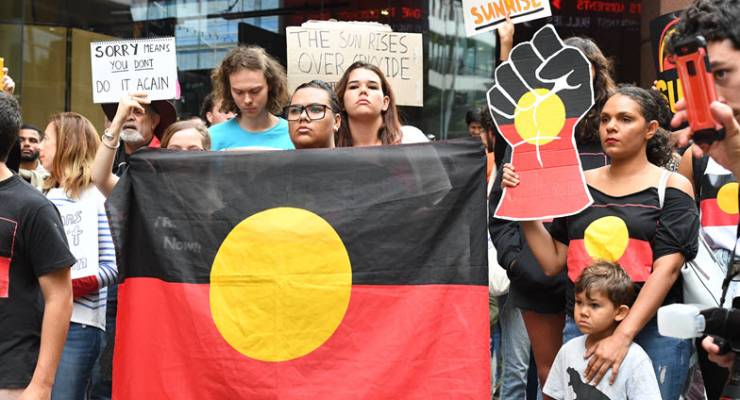
The broadcasting regulator has found that Seven provoked serious contempt on the basis of race in a widely-criticised panel segment on Sunrise about the adoption of Indigenous children. The Australian Media and Communications Authority (ACMA) also found Seven in breach of the accuracy requirement for statements made during the segment.
In the error-ridden segment broadcast in March, host Samantha Armytage kicked the panel off on the topic by referencing a misleading Courier-Mail headline (on a factual story based on comments made by David Gillespie) about Indigenous children in care. Armytage introduced the topic by saying Indigenous children could “only be placed with relatives or other Indigenous families” — taken from the newspaper headline. This is not true, and ACMA found that even though it was read out from the newspaper, Seven should’ve fact-checked it before using it for a panel discussion.
[Controversial Sunrise segment misused file footage provided by non-profit]
The segment went downhill from that opening, when panellists Prue MacSween and Ben Davis made references to a “generation” of Indigenous children being abused. During the segment, MacSween also suggested that some children taken from their families as part of the Stolen Generations were taken for their own “wellbeing”.
ACMA found that the story also incited contempt for a group of people based on their race:
The segment was framed in such a way that it set up a dichotomy between ‘Indigenous families’ and ‘white families’ and then asserted that the (inaccurately described) ‘rule’ requiring Aboriginal children to be placed with other Indigenous families meant Aboriginal children would be ‘left in these dangerous environments’ or in ‘that culture’. The segment would have conveyed to an ordinary reasonable viewer that the panellists and presenter were presenting a view that child abuse and neglect are commonplace in Indigenous families, that it is unsafe for at-risk Indigenous children to be placed in other Indigenous families, and that they should be removed from Indigenous communities and adopted by ‘white’ families for their protection.
Seven argued that the panellists were being critical of politicians, bureaucrats and commentators rather than of Indigenous people, but ACMA made its finding based on how the ordinary person would have interpreted the segment, rather than what was intended.
The finding of serious contempt is rare for ACMA — it has a high threshold. Previous breaches include 2GB broadcaster Alan Jones’ Cronulla riots comments, and A Current Affair’s segment on an “all-Asian mall”.
ACMA chair Nerida O’Loughlin said that topics like child abuse in Indigenous communities could be discussed, but it needed to be done more carefully than Sunrise did.
“Broadcasters can, of course, discuss matters of public interest, including extremely sensitive topics such as child abuse in Indigenous communities. However, such matters should be discussed with care, with editorial framing to ensure compliance with the code,” she said. “The ACMA considers that the high threshold for this breach finding was met, given the strong negative generalisations about Indigenous people as a group.”
Seven news director Craig McPherson said in a statement that the network would take the decision to court, saying the finding was a “form of censorship” and a “direct assault on the workings of an independent media”.
“We are extremely disappointed the ACMA has seen fit to cast a label on a segment that covered an important matter of public interest, child abuse, sparked by comments attributed to a government minister and widely circulated in the press on the morning of the broadcast,” he said.
“The irony is that the very issue the commentators were critical of, that is political correctness preventing meaningful discussion and action, has come to bear with this finding. The finding seeks to rule out issues and topics for discussion segments, as determined by ACMA.”
ACMA said it was still discussing Seven’s response. Seven has previously challenged ACMA’s ruling in the courts, including a finding of vilification over a Sunday Night report about a tribe in the Amazon, which Seven lost.








Crikey is committed to hosting lively discussions. Help us keep the conversation useful, interesting and welcoming. We aim to publish comments quickly in the interest of promoting robust conversation, but we’re a small team and we deploy filters to protect against legal risk. Occasionally your comment may be held up while we review, but we’re working as fast as we can to keep the conversation rolling.
The Crikey comment section is members-only content. Please subscribe to leave a comment.
The Crikey comment section is members-only content. Please login to leave a comment.